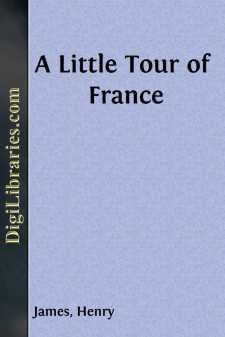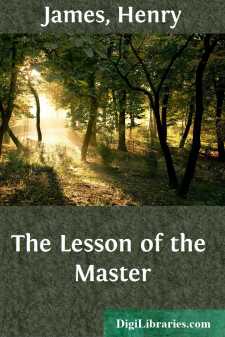Categories
- Antiques & Collectibles 13
- Architecture 36
- Art 48
- Bibles 22
- Biography & Autobiography 813
- Body, Mind & Spirit 142
- Business & Economics 28
- Children's Books 17
- Children's Fiction 14
- Computers 4
- Cooking 94
- Crafts & Hobbies 4
- Drama 346
- Education 46
- Family & Relationships 57
- Fiction 11829
- Games 19
- Gardening 17
- Health & Fitness 34
- History 1377
- House & Home 1
- Humor 147
- Juvenile Fiction 1873
- Juvenile Nonfiction 202
- Language Arts & Disciplines 88
- Law 16
- Literary Collections 686
- Literary Criticism 179
- Mathematics 13
- Medical 41
- Music 40
- Nature 179
- Non-Classifiable 1768
- Performing Arts 7
- Periodicals 1453
- Philosophy 64
- Photography 2
- Poetry 896
- Political Science 203
- Psychology 42
- Reference 154
- Religion 513
- Science 126
- Self-Help 84
- Social Science 81
- Sports & Recreation 34
- Study Aids 3
- Technology & Engineering 59
- Transportation 23
- Travel 463
- True Crime 29
Sort by:
by:
Henry James
I Strether's first question, when he reached the hotel, was about his friend; yet on his learning that Waymarsh was apparently not to arrive till evening he was not wholly disconcerted. A telegram from him bespeaking a room "only if not noisy," reply paid, was produced for the enquirer at the office, so that the understanding they should meet at Chester rather than at Liverpool remained to...
more...
by:
Henry James
"NO, my lord," Banks had replied, "no stranger has yet arrived. But I'll see if any one has come in—or who has." As he spoke, however, he observed Lady Sandgate's approach to the hall by the entrance giving upon the great terrace, and addressed her on her passing the threshold. "Lord John, my lady." With which, his duty majestically performed, he retired to the...
more...
by:
Henry James
CHAPTER I Mrs. Munden had not yet been to my studio on so good a pretext as when she first intimated that it would be quite open to me—should I only care, as she called it, to throw the handkerchief—to paint her beautiful sister-in-law. I needn’t go here more than is essential into the question of Mrs. Munden, who would really, by the way, be a story in herself. She has a manner of her own of...
more...
by:
Henry James
A SMALL BOY AND OTHERS I In the attempt to place together some particulars of the early life of William James and present him in his setting, his immediate native and domestic air, so that any future gathered memorials of him might become the more intelligible and interesting, I found one of the consequences of my interrogation of the past assert itself a good deal at the expense of some of the...
more...
by:
Henry James
PREFACE "The Portrait of a Lady" was, like "Roderick Hudson," begun in Florence, during three months spent there in the spring of 1879. Like "Roderick" and like "The American," it had been designed for publication in "The Atlantic Monthly," where it began to appear in 1880. It differed from its two predecessors, however, in finding a course also open to it, from...
more...
by:
Henry James
On the morrow, in the evening, Lord Warburton went again to see his friends at their hotel, and at this establishment he learned that they had gone to the opera. He drove to the opera with the idea of paying them a visit in their box after the easy Italian fashion; and when he had obtained his admittance—it was one of the secondary theatres—looked about the large, bare, ill-lighted house. An act...
more...
by:
Henry James
PrefacePrefaceThe notes presented in this volume were gathered, as will easily be perceived, a number of years ago and on an expectation not at that time answered by the event, and were then published in the United States. The expectation had been that they should accompany a series of drawings, and they themselves were altogether governed by the pictorial spirit. They made, and they make in appearing...
more...
by:
Henry James
CHAPTER I The poor young man hesitated and procrastinated: it cost him such an effort to broach the subject of terms, to speak of money to a person who spoke only of feelings and, as it were, of the aristocracy. Yet he was unwilling to take leave, treating his engagement as settled, without some more conventional glance in that direction than he could find an opening for in the manner of the large...
more...
by:
Henry James
CHAPTER I. Rowland Mallet had made his arrangements to sail for Europe on the first of September, and having in the interval a fortnight to spare, he determined to spend it with his cousin Cecilia, the widow of a nephew of his father. He was urged by the reflection that an affectionate farewell might help to exonerate him from the charge of neglect frequently preferred by this lady. It was not that the...
more...
by:
Henry James
CHAPTER I He had been told the ladies were at church, but this was corrected by what he saw from the top of the steps—they descended from a great height in two arms, with a circular sweep of the most charming effect—at the threshold of the door which, from the long bright gallery, overlooked the immense lawn. Three gentlemen, on the grass, at a distance, sat under the great trees, while the...
more...











